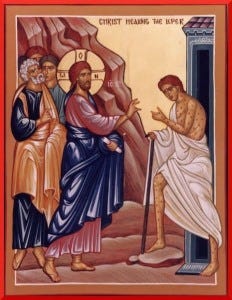Returning to the Camp
A reflection on the readings for the First Sunday of Lent
“The one who bears the sore of leprosy
shall keep his garments rent and his head bare,
and shall muffle his beard;
he shall cry out, ‘Unclean, unclean!’
As long as the sore is on him he shall declare himself unclean,
since he is in fact unclean.
He shall dwell apart, making his abode outside the camp.”
Kicking the leper out of the camp makes a lot of sense. Left untreated, leprosy (what we now call, with somewhat less of a stigma, Hansen’s Disease) can be a disfiguring and debilitating disease. A quick image search on Google reveals all manner of extreme cases. And of course the ancient Israelites didn’t have modern antibiotics. For the good of the community, the common sense thing seems to be to quarantine the sick.
A leper came to Jesus and kneeling down begged him and said,
“If you wish, you can make me clean.”
Moved with pity, he stretched out his hand,
touched him and said to him,
“I do will it. Be made clean.”
I guess we should be thankful that Jesus didn’t necessarily subscribe to our understanding of common sense. Jesus doesn’t turn away when he encounters a leper. He doesn’t tell the man to make his abode elsewhere. Jesus is moved with pity, his heart is rent for the man. This sympathy moves Jesus to touch the leper, to make physical contact with someone physically deformed by the disease. Jesus risks not only ritual uncleanliness but contagion. Jesus wills the leper to be clean and dismisses him – not as a stigmatized other, but as a newly reunited brother.
I don’t know any lepers, and I bet that’s true for most of us. But we do know people who feel stigmatized, marginalized, or ostracized. For some, maybe it’s “for the good of the community” – they represent some threat, some danger to the bonds that tie. Perhaps they’ve been told a version of “it would be better if you just left.” For others, maybe it was never so explicit; just a slow sliding away from relationships, an internal sense that they didn’t belong anymore.
The other day I was told to “Repent and believe in the Gospel.” If we really do believe in the Gospel, then we, like Jesus, should make contact with those who are “making their abode outside the camp.” Perhaps this Lent we might work to bring ourselves into community with those we’ve marginalized.





